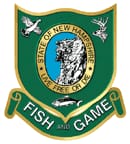CWD Detected in Pennsylvania Deer; New Hampshire Hunters Reminded of Import Ban
OutdoorHub 10.12.12

With the recent discovery of Chronic Wasting Disease (CWD) in a Pennsylvania deer, New Hampshire Fish and Game Department officials are reminding hunters of the ban on importing intact deer carcasses from CWD-positive jurisdictions such as Pennsylvania, into New Hampshire.
Current regulations prohibit the importation into New Hampshire of hunter-killed cervid carcasses or parts of carcasses from the jurisdictions in which CWD has been detected, except for de-boned meat, antlers, antlers attached to skull caps from which all soft tissue has been removed, upper canine teeth (a.k.a. buglers, whistlers or ivories), hides or capes with no part of the head attached, and finished taxidermy mounts.
To date, CWD has been detected in wild or captive deer or elk in 23 states and provinces: Alberta, Canada; Colorado; Iowa; Illinois; Kansas; Maryland; Michigan; Minnesota; Missouri; Montana; Nebraska; New Mexico; North Dakota; Oklahoma; Pennsylvania; Saskatchewan, Canada; South Dakota; Texas; Utah; Virginia; West Virginia; Wisconsin; and Wyoming.
New Hampshire’s regulations are designed to minimize the risk of the state’s deer and moose being exposed to CWD through the importation of an infected animal, or the disposal of brain or nervous tissue, lymph nodes, bones and other tissue from an infected hunter-killed animal. The disease agent of CWD, an abnormal protein called a prion, is very stable and could easily be spread if diseased deer parts were disposed of in our environment.
Hunters should also note that while New Hampshire now permits importation of whole deer from New York, regulations in Massachusetts and Vermont have not changed, and these states prohibit the transport of New York-killed deer across their state lines.
A CWD monitoring and testing program for wild deer has been conducted in New Hampshire by Fish and Game biologists since 2002. There is no evidence that this disease exists in the New Hampshire deer herd. The rules and testing program are designed to prevent exposure via infected animals being imported from other areas.
CWD is a contagious neurological disease that is fatal to deer, moose, elk, and other members of the cervid (deer) family. It is classified as a transmissible spongiform encephalopathy or TSE, and it attacks the brains of infected animals, resulting in their becoming emaciated, exhibiting abnormal behavior and eventually dying.
State officials remind hunters and others who enjoy eating venison that CWD is a wildlife management issue, not a public health issue. There is no evidence that CWD is linked to disease in humans.

